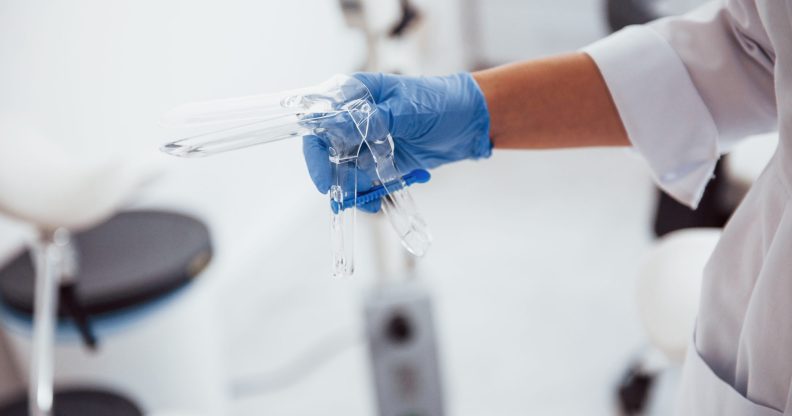Thousands of trans people in England could be missing out on routine cancer screenings

A doctor holding a speculum, the instrument used in cervical-cancer screenings. (Envato/mstandret)
Medical experts have warned that “tens of thousands” of trans people in England could be missing out on vital cancer screenings.
The World Cancer Congress in Geneva, which took place from 17 to 19 September, highlighted the importance of regular cervical and breast cancer screenings for the trans community. However, transgender men are not currently offered breast or cervical screenings.
And trans women whose GP details do not align with their gender, are not offered breast screenings, despite the NHS acknowledging that the use of combined HRT (a drug with oestrogen and progesterone) can slightly increase the chances of breast cancer.
Up to 500,000 trans people are estimated to be living in the UK.
‘Solution must be co-created with trans patients directly’
At the summit, Stewart O’Callaghan, the chief executive of the charity OutPatients, spoke about the issue of how GP electronic records are updated in England.
“Even if only 10 per cent change the gender on their GP record, that means tens of thousands are unable to easily access a routine mammogram or smear test that could detect cancer early and save lives, O’Callaghan told The Guardian.

The “system needs to find a way to track trans status without removing a person’s right to privacy”, they added.
“A potential solution would be having both gender and sex registered at birth on the patient record but the latter only being accessible at a system level or by clinicians with permission. Any solution to this issue must be co-created with trans patients directly.”
Discrimination found to prevent queer people seeking medical help
Dr Alison May Berner, an oncologist specialising in cancer care for trans people, said: “We all have busy lives and rely on these vital systems to remind us to access screening. On top of that, these screenings can be dysphoric for trans people.
“Putting the burden on the individual to approach the GP compounds existing healthcare inequalities for trans patients.”
Trans woman Heather Peto previously told PinkNews that she had been feeling run down for a while before realising that something serious might be wrong.
A recent study revealed that homophobia or transphobia can indirectly increase the chances of queer people developing cancer and worsen health outcomes for those who do.
The report, which explored rates of cancers in all people and encouraged Americans to get screened for the disease, also found that discrimination within healthcare settings can prevent LGBTQ+ people seeking medical help.
Share your thoughts! Let us know in the comments below, and remember to keep the conversation respectful.
How did this story make you feel?

